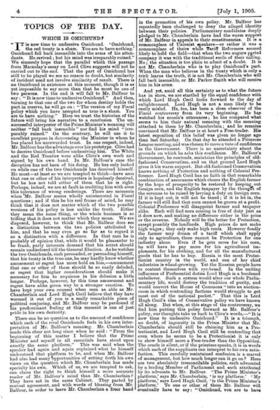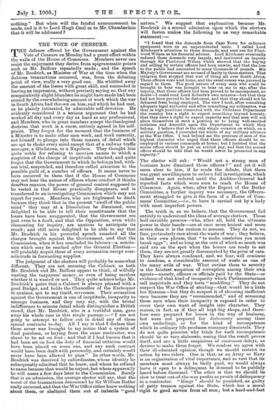WHICH IS OlYaCHUND P TOPICS OF THE DAY.
"F is now time to undeceive Omichund. 'Omichund, the red treaty is a sham. You are to have nothing.' Omichund fell back insensible into the arms of his atten- dants. He revived ; but his mind was irreparably ruined." We sincerely hope that the parallel which this passage from Macaula,y's essay on Lord Clive suggests will not be carried out to the end. That the part of Omichund has still to be played we see no reason to doubt, but similarity of incident need not involve similarity of result. There is an Omichund in existence at this moment, though it is as yet impossible to say more than that he must be one of two persons. In the end it will fall to Mr. Balfour to say : "it is now time to undeceive Omichund." And then, turning to that one of the two for whom destiny holds the part in reserve, he will go on : "The version of my Fiscal policy which you have accepted as true is a sham. You are to have nothing." Here we trust the historian of the future will bring his narrative to a conclusion The un- successful interpreter of the Prime Minister's meaning will neither "fall back insensible" nor find his mind "irre- parably ruined." On the contrary, he will use it to excellent purpose in denouncing the Minister in whom he has placed his unrewarded trust. In one respect, indeed, Mr. Balfour has the advantage over his prototype. Clive had to deceive Omichund before undeceiving him. The White and the Red Treaties were alike Olive's own work and signed by his own hand. In Mr. Balfour's case the deception has not been of his doing. He has only looked on while one of the two Omichunds has deceived himself. He must—at least so we are tempted to think—have seen that one or other of his interpreters is hopelessly deceived, but he has not told either of them that he is right. Perhaps, indeed, we are at fault in crediting him with even this tolerance of wrong renderings. There are moments when 'Mr. Balfour seems wholly uninterested in Fiscal questions ; and if this be his real frame of mind, he may think that it does not matter which of the two possible versions of his policy is less unlike the truth. Either they mean the same thing, or the whole business is so trilling that it does not matter which they mean. We are disposed, however, to think that Mr. Balfour does see a distinction between the two policies attributed to him, and that he may even go so far as to regard it as a distinction with a difference. In that case he is probably of opinion that, while it would be pleasanter to be frank, party interests demand that his secret should remain undisclosed till the General Election. As he watches the two Omichunds, each persuaded, or persuading himself, that his treaty is the true one, he may hardly know whether amusement or regret has more hold on him,—arnusement that one or other of them should be so easily deluded, or regret that higher considerations should make it necessary for him to acquiesce in his delusion a little longer. Perhaps, however, by this time amusement and regret have alike given way to a stronger emotion. To have kept your own counsel when men as able as Mr. Chamberlain and Lord Hugh Cecil believe that they have wormed it out of you is a really remarkable piece of political conjuring, and Mr. Balfour may be pardoned if his predominant feeling at this moment is one of just pride in his own dexterity.
There can be no question as to the amount of confidence which each of the rival Omichunds feels in his own inter- pretation of Mr. Balfour's meaning. Mr. Chamberlain made this clear not long since when he said : "From the beginning of this matter I believe that the Prime Minister and myself in all essentials have stood upon exactly the same platform." This was said when the speaker had again and again explained what he himself understood that platform to be, and when Mr. Balfour had also had many tpportunities of setting forth his own views on tho question which Mr. Chamberlain has made specially his own. Which of us, we are tempted to ask, can claim the right to think himself a more accurate reader of Mr. Balfour's mind than Mr. Chamberlain ? They have sat in the same Cabinet. They parted by mutual agreement, and with words of blessing from Mr. Balfour, in order to leave Mr. Chamberlain a, freer hand in the promotion of his own policy. Mr. Balfour bas repeatedly been challenged to deny the alleged identity between their policies. Parliamentary candidates deeply pledged to Mr. Chamberlain have had the warm support of Mr. Balfour in appeals to their constituencies. It is a commonplace of Unionist speakers—or rather it was a, commonplace of theirs while Tariff Reformers seemed likely to hold. the field—that when the two augurs pvted company it was with the traditional smile of their caning. No; the situation is too plain to admit of a doubt. It is not Mr. Chamberlain who is to play Omichund's part. When the man who believes in the treaty which is only a trick learns the truth, it is not Mr. Chamberlain who will fall back insensible, or Mr. Parker Smith who will receive him in his arms.
And yet, amid. all this certainty as to what the future has in store, we are startled by the equal confidence with which Lord Hugh Cecil looks forward to the day of enlightenment. Lord Hugh is not a, man likely to be easily misled. He, too, has been a close observer of the Fiscal controversy from its very beginning. He haa watched his cousin's utterances ; he has compared what seems to him their natural meaning with the meaning attached to them by Mr. Chamberlain ; and he remains convinced that Mr. Balfour is at heart a Free-trader. His latest exposition of this belief was given no longer ago than last Saturday. On that day he attended a Primrose League meeting, and was chosen to move a vote of confidence in the Government. There is no uncertainty about the grounds on which he asks this confidence. Mr. Balfour's Government, he contends, maintains the principles of old- fashioned Conservatism, and on that ground Lord Hugh gives it his warm support. But old-fashioned Conservatism knows nothing of Protection and nothing of Colonial Pre- ference. Lord Hugh Cecil has no faith in that remarkable combination of assurances which cheers the English farmer by the hope of prosperity to be restored by keeping out foreign corn, and the English taxpayer by the thouglft of the revenue to be raised by levying a duty on foreign corn. If it is kept out, it will not be taxed ; if it is let in, the farmer will still find that corn cannot be grown at a profit. Colonial Preference will disappoint farmer and taxpayer alike. Each will find corn coming in free of duty just as it does now, and making no difference either in the price or the revenue. Nobody will be the better for Protection, except possibly the landlords. High prices do not make high wages ; they only make high rents. However fondly the farmer may dream of a tariff which shall apply only to agriculture, there cannot be Protection for one industry alone. Even if he gets more for his corn, he will have to pay more for his agricultural im- plements, for his clothing, and for all the manufactured goods that he has to buy. Russia is the most Protec- tionist country in the world, and one of her chief industries is wheat-growing. Yet the Russian people have to content themselves with rye-bread: In the uniting influences of Preferential duties Lord Hugh is a hardened unbeliever. Such a system would alter our whole Parlia- mentary life, would destroy the tradition of purity, and would convert the House of Commons "into an auction- room in which contending factions would struggle to get most out of the national pocket." That this is Lord Hugh Cecil's idea of Conservative policy we have known all along. But when, at this stage of the controversy, we find him putting this policy forward as Mr. Balfour's policy, our thoughts take us back to Olive's words,—" It is now time to undeceive Omichund." It is a triumph, no doubt, of ingenuity in the Prime Minister that Mr. Chamberlain should still be claiming him as a Pro- tectionist, and Lord Hugh Cecil still be contending that even where he seems to be a Protectionist it is only to show himself more a Free-trader than the Opposition-. The oracle is silent, or if the priestess speaks, it is in words which each of the suppliants can interpret to his own satis- faction. This carefully maintained confusion is a marvel of management, but how much longer can it go on ? Here are two absolutely irreconcilable policies, each advocated by a leading Member of Parliament and. each attributed by its advocate to Mr. Balfour. 'The Prime Minister's platform,' says Mr. Chamberlain, 'is my platform.' 'My platform,' says Lord Hugh Cecil, is the Prime Minister's platform.' To one or other of them Mr. Balfour will eventually have to say: "Omichund, von are to have nothing." But when will the fateful announcement be made, and is it to Lord Hugh Cecil or to Mr. Chamberlain that it will be addressed ?











































 Previous page
Previous page